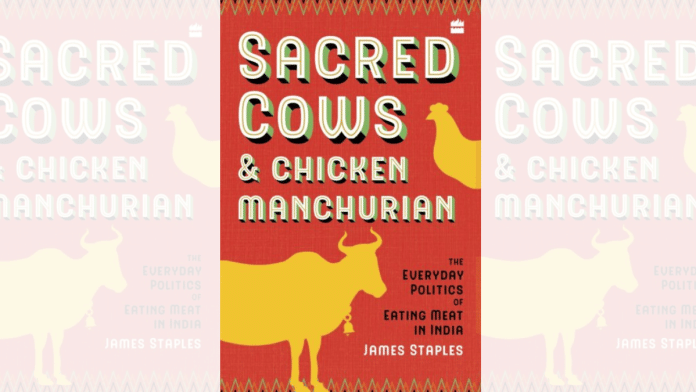In ‘Sacred Cow and Chicken Manchurian,’ Anthropologist James Staples explores the intersection of food, politics, and societal dynamics in India.
Challenging binary opposition exacerbated by the rise of Hindu nationalism, the book delves into how food choices intertwine with politics, triggering riots, vigilante attacks, and even murders. Staples navigates nuances in people’s eating habits, cultural contexts, and the disparities between rhetoric and everyday actions.
James Staples is reader in social anthropology at Brunel University London and author of Leprosy and a Life in South India: Journeys with a Tamil Brahmin and Peculiar People, Amazing Lives: Leprosy, Social Exclusion and Community Making in South India.
In this book, he attempts to unravel the complexities surrounding the consumption of beef in a politically charged environment.
Drawing on decades of ethnographic research in South India, Staples charts the journey of various stakeholders in the contemporary political and cultural climate, including cattle owners, brokers, butchers, cooks, and occasional beef eaters.
In this context, the discussion around how Indian food has become a tool of soft power and its politicization is particularly relevant, highlighting the intricate relationship between culinary practices and national identity.
‘Sacred Cow and Chicken Manchurian‘ offers detailed exploration, mapping the current situation within the broader anthropology of food and eating in the region and revealing critical aspects of Indian identity in the early twenty-first century.
Published by HarperCollins India, ‘Sacred Cow and Chicken Manchurian’ by James Staples will be released on 29 February on SoftCover, ThePrint’s online venue to launch non-fiction books.
Krishnendu Ray, a professor at New York University and an authority in Food and Cultural Sociology, commends the author for skillfully navigating the highly controversial subject matter in India. “The very subject matter is hugely controversial in India, but the author successfully argues against further polarization in our thinking, presenting his research clearly and thoughtfully. Beautifully written,” he wrote.
Radhika Govindrajan, an Indian-American anthropologist and university professor at the University of Washington, applauds the work as a rich and textured ethnography. She highlights the author’s intervention in the growing literature on bovine politics, religion, and caste in contemporary India.
Also read: Bihari kebab to Rampuri adrak halwa—new book discovers forgotten food memories of Muslims






